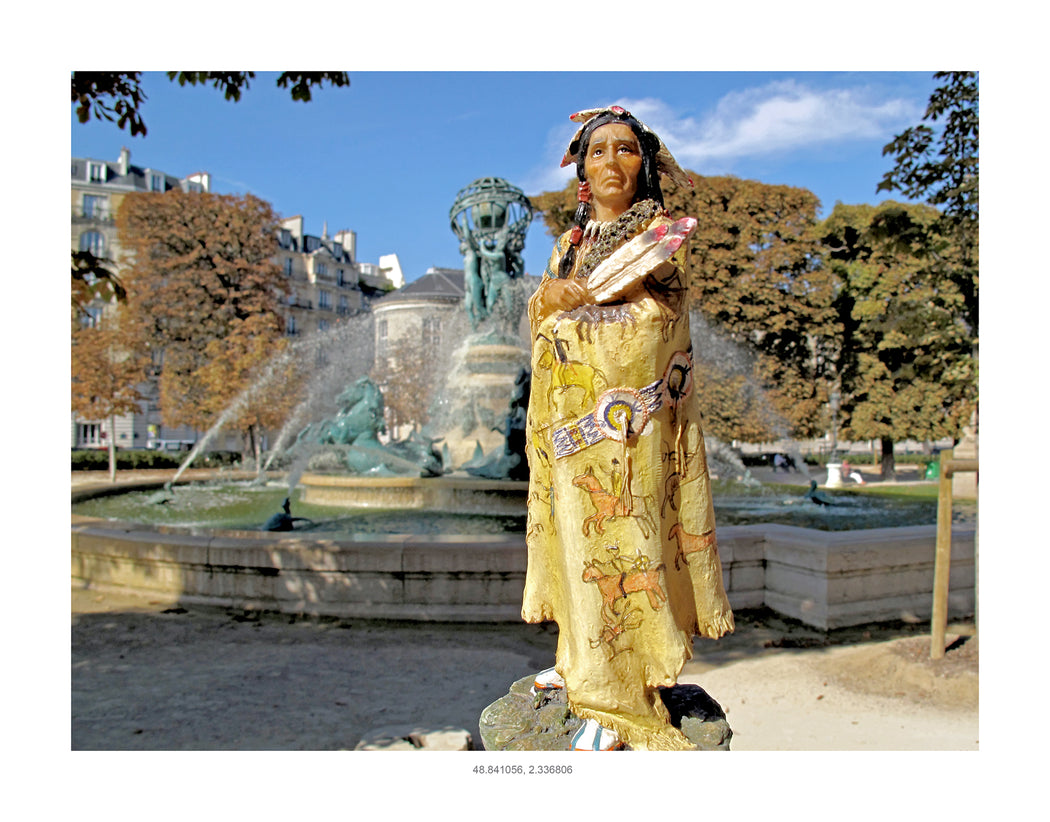
Jeff Thomas
Paris, France, Buffalo Robe at The Fontaine de l'Observatoire, E south of the Jardin du Luxembourg in the 6th arrondissement of Paris, (North American Indian Woman), GPS coordinates: 48.841056 by Jeff Thomas
 Toronto, ON)
Toronto, ON)
Learn about our Shipping & Returns policy.
Have a question? Read our FAQ.
- Artwork Info
- About the Artist
- Artist Docs
-
2010
Pigment print on archival paper
Signed, au mount verso
Printed in 2022
Edition of 15 -
Jeff Thomas is an independent curator and photographer who deals, in examination of his own history and identity, with issues of aboriginality that have arisen at the intersections of Native and non-Native cultures in what is now Ontario and northern New York state. Nationally recognized for ground-breaking scholarship and innovative curatorial practice in this area, he has been involved in major projects at such prominent cultural institutions in Canada as the Canadian Museum of Civilization, the Woodlands Cultural Centre, the Art Gallery of Ontario, and Library and Archives Canada.
As his curatorial projects, publications and exhibitions amply demonstrate he is committed to work dealing with issues of race, aboriginality, and gender in both archival and contemporary photography dealing with Aboriginal peoples. He is author of Where are the Children? Healing the Legacy of the Residential Schools, a ground-breaking exhibition sponsored by the Aboriginal Healing Foundation to publicly recognize, through photographic history, the aboriginal experience of the residential school system in Canada. His research into historical aboriginal experience and its contemporary relevance has also resulted in the Canadian Museum of Civilization project, Emergence from the Shadow: First People's Photographic Perspectives, a critically-acclaimed study historical photographs by early 20th century Canadian anthropologists of members of the Six Nations community at Brantford, a show that provided contemporary members of that community their first access to these images of their ancestors and of historical life on the reserve.
It is not surprising, as a result, that he was commissioned to research and design the first Aboriginal intervention into the Euro-Canadian art installation at the Art Gallery of Ontario, No Escapin' This: Confronting Images of Aboriginal Leadership. Intended to mark the institution's new commitment to the introduction of Native history into the gallery's spaces, No Escapin' This has also effectively solidified Thomas's place at the forefront of scholarship at the intersection of Native and non-Native histories in Canada.
The following excerpt is from Jeff-Thomas.ca
“Looking at First Nations peoples’ past through a frame of photographs, paintings, and films produced by white society has always left me feeling uneasy due to the silences coming from these images. I wondered what the indigenous sitters were thinking about. How did they see their world in comparison to how their world was being represented? This question would eventually form a foundation for my work in the visual arts, influencing my photographic practice, my research, and my role as an independent curator. I was determined to challenge the silences in the archive; to build a new paradigm that connects past and present.
“I began by looking to my childhood and my experiences sitting around the kitchen table on the farm at the Six Nations Reserve and listening to my elders tell stories about life on the reserve. Topics ranged from politics to everyday gossip to the price of pigs. Given my fascination with conversations and storytelling, it is not surprising that I was uncomfortable with the silences I perceived in most photographs of First Nations peoples.
“But the images of Edward S. Curtis, and his accompanying texts, seem to hint at possible conversations. Although Curtis’s work is often vilified, I wanted to find a way to engage with historical images without either romanticizing or dismissing them. His images make me long to hear the subjects’ voices. I search for these “outtakes” and use my own work to suggest what they may have looked like. When, in his text, Curtis says that he doesn’t know what is on the “other side” of assimilation, he left the door open to someone like me to pick up where he left off.”
-
Artist CV (PDF)
Artist Bio (PDF)


